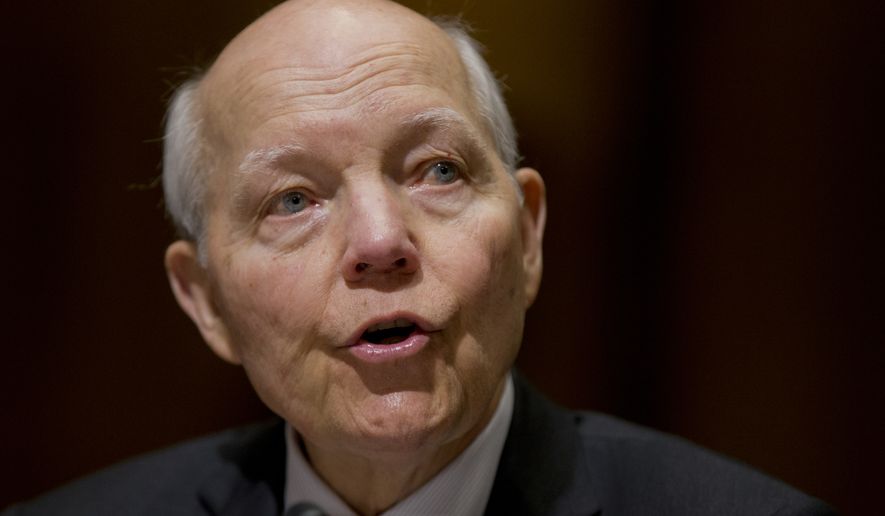The IRS is refusing to recant the targeting criteria it used to single out tea party groups for intrusive scrutiny, according to court filings made public Wednesday that show the tax agency still struggling with the fallout from the scandal.
At least three tea party groups are still awaiting approval from the IRS more than three years after agents publicly admitted they’d asked inappropriate questions and put the groups through unreasonable delays in obtaining tax-exempt status.
Last month the IRS told both Congress and a federal judge that it would start processing the outstanding applications — but the agency has refused to say how or when, leaving the groups themselves struggling to make sense of things.
Making matters ever more difficult, the IRS specifically refused in court papers to reject further use of the criteria it used to single out tea party and conservative groups in the first place.
“Despite all the representations made by the IRS about having changed its ways, it still asserts that the viewpoint-based Targeting Criteria are relevant for making a determination of tax-exempt status,” Edward Greim, the lawyer representing tea party groups in a class-action lawsuit, told the U.S. District Court for the Southern District of Ohio.
Just weeks ago, IRS Commissioner John G. Koskinen had assured Congress the targeting was a thing of the past, and said his agency will no longer use the “Be on lookout,” or BOLO, lists.
Mr. Koskinen was responding after a federal appeals court in Washington, D.C., delivered a firm rebuke to the tax agency, saying that as long as groups singled out for special scrutiny are still awaiting approval, the targeting is still going on.
After the admonition, the tax commissioner ordered his agents to begin to process the applications of the Texas Patriots Tea Party and two other groups that have been waiting years. One of them, the Albuquerque Tea Party, has been waiting for nearly seven years.
“There should be no doubt that the use of BOLO lists has not just been temporarily suspended, it has been eliminated,” Mr. Koskinen said in letters to key committees on Capitol Hill.
Mr. Greim told the judge it was impossible to reconcile Mr. Koskinen’s assurances with the IRS’ own declarations to the court in a July filing that it would not recant the use of its “targeting criteria” to evaluate tea party groups in the future.
In that filing, Mr. Greim asked the IRS to “admit that the Targeting Criteria are irrelevant to determining whether an entity qualifies for tax exemption.” The IRS replied simply with “Deny.”
Even stranger is the IRS objected to the use of the word “targeting” for its illicit behavior toward the tea party groups, calling the word “inflammatory” and “prejudicial.”
“Instead, the proper phrase should be ’Principal Class criteria,’” the IRS insisted.
Mr. Greim rejected that suggestion, pointing out that the federal judge who certified the class action lawsuit herself used the term “targeting” to describe what the IRS did to the tea party.
“The blatant impropriety of the Targeting Criteria under the Constitution is a central issue in this case,” he wrote.
The IRS didn’t respond to a request for comment Wednesday. Last month it declined to answer questions from The Washington Times about the new procedures it would use to judge the three groups still awaiting approval.
Mr. Greim said to be wary of IRS promises, saying the agency has been willing to mislead the court in the past with a “willingness to say one thing (in a sworn declaration, no less) and do the other.”
And he said the IRS has hinted that while it may replace its targeting list, which delays or blocks applications at the front end, it could step up “less well-known forms of scrutiny,” including ongoing reviews of tea party groups.
Agency officials have previously admitted they put tea party groups through inappropriate scrutiny. There is no evidence that the targeting was ordered by the White House, but it did extend to the highest levels of the IRS’ D.C. headquarters — contrary to what the IRS had initially implied.
IRS officials say they got confused by the standards for judging nonprofit applicants’ political activities in the wake of a 2010 Supreme Court case, and were awaiting better guidance.
• Stephen Dinan can be reached at sdinan@washingtontimes.com.




Please read our comment policy before commenting.